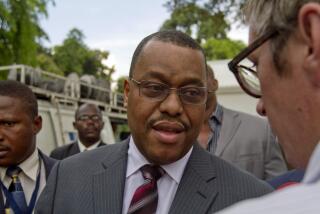Aristide Reasserts Claim as Haiti’s Leader : Caribbean: Unlike U.S. Congress members, the ousted president stops short of calling for military intervention to restore him to power.
- Share via
MIAMI — Exiled Haitian President Jean-Bertrand Aristide reaffirmed his determination Saturday to resume his place as Haiti’s first democratically elected leader, while supporters, including U.S. politicians, called for military intervention to return him to power.
“It is time for deliverance,” Aristide said at a conference called to find solutions to the political impasse in Haiti.
Referring to the military leaders who overthrew him in a September, 1991, coup, Aristide said: “Professional criminals are knocking down the democratic government of the people. We are asking for what is ours.”
Although Aristide said several days ago that he no longer opposes a “surgical strike” against coup leaders, he has stopped short of calling for a full-scale invasion by U.S. troops.
But several members of the congressional Black Caucus, an organization of black members of Congress, urged the Clinton Administration to send in U.S. soldiers, and one of Aristide’s closest aides appeared to support the notion.
“The people of Haiti are not opposed to any means, including armed intervention,” said Herve Denis, Haiti’s minister for information and culture.
The three-day conference on Haiti was called by Aristide in hopes of rallying world support for tightening a U.N.-ordered oil and arms embargo designed to punish the Haitian military, and to discuss strategy for breaking the stalemate over his return.
Although Aristide and Haitian military ruler Lt. Gen. Raoul Cedras signed an accord last July that outlined a transfer of power, Cedras reneged on his promise to resign and turn over the government to Aristide, who was elected to office in December, 1990.
Cedras and other Haitian military leaders declined an invitation to attend the weekend conference.
Aristide showed impatience with any more negotiations with the military and set Feb. 7 as the date by which he hopes to resume his presidency in Haiti.
Among those who attended the conference were officials of the United Nations and the Organization of American States and representatives of the “Four Friends of Haiti”--Canada, Venezuela, France and the United States.
The Clinton Administration sent Lawrence A. Pezzullo, the President’s special envoy to Haiti.
Pezzullo described the situation in Haiti as a “cruel impasse” but expressed hope that economic sanctions eventually will lead to the military’s downfall.
But several members of the Black Caucus, including U.S. Reps. Charles B. Rangel (D-N.Y.), Major R. Owens (D-N.Y.) and Carrie Meek (D-Fla.), seemed to suggest that military force is the only option left.
“Surely, with all the power of the U.S., if we really wanted to return Jean-Bertrand Aristide, we would do it,” Owens said. “Something is wrong somewhere.”
Added Meek: “Diplomacy is not working. . . . We need military intervention in Haiti.”
The Black Caucus has been increasingly critical of the Clinton Administration’s failure to find a solution in Haiti.
During the presidential campaign, Bill Clinton indicated that finding a solution to Haiti would be a priority for his Administration.
More to Read
Sign up for Essential California
The most important California stories and recommendations in your inbox every morning.
You may occasionally receive promotional content from the Los Angeles Times.













